Brahe, Tycho
Danish astronomer
Introduction
born December 14, 1546, Knudstrup, Scania, Denmark
died October 24, 1601, Prague
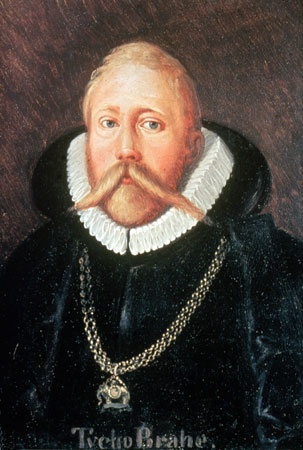 Danish astronomer whose work in developing astronomical instruments and in measuring and fixing the positions of stars paved the way for future discoveries. His observations—the most accurate possible before the invention of the telescope—included a comprehensive study of the solar system and accurate positions of more than 777 fixed stars.
Danish astronomer whose work in developing astronomical instruments and in measuring and fixing the positions of stars paved the way for future discoveries. His observations—the most accurate possible before the invention of the telescope—included a comprehensive study of the solar system and accurate positions of more than 777 fixed stars.Youth and education
Tycho's father was a privy councillor and later governor of the castle of Helsingborg, which controls the main waterway to the Baltic Sea. His wealthy and childless uncle abducted Tycho at a very early age and, after the initial parental shock was overcome, raised him at his castle in Tostrup, Scania, also financing the youth's education, which began with the study of law at the University of Copenhagen in 1559–62.
Several important natural events turned Tycho from law to astronomy. The first was the total eclipse of the Sun predicted for August 21, 1560. Such a prediction seemed audacious and marvelous to a 14-year-old student, but when Tycho witnessed its realization he saw and believed—the spark was lit—and, as his many later references testify, he never forgot the event. His subsequent student life was divided between his daytime lectures on jurisprudence, in response to the wishes of his uncle, and his nighttime vigil of the stars. The professor of mathematics helped him with the only printed astronomical book available, the Almagest of Ptolemy, the astronomer of antiquity who described the geocentric conception of the cosmos. Other teachers helped him to construct small globes, on which star positions could be plotted, and compasses and cross-staffs, with which he could estimate the angular separation of stars.
In 1562 Tycho's uncle sent him to the University of Leipzig, where he studied until 1565. Another significant event in Tycho's life occurred in August 1563, when he made his first recorded observation, a conjunction, or overlapping, of Jupiter and Saturn. Almost immediately he found that the existing almanacs and ephemerides, which record stellar and planetary positions, were grossly inaccurate. The Copernican tables were several days off in predicting this event. In his youthful enthusiasm Tycho decided to devote his life to the accumulation of accurate observations of the heavens, in order to correct the existing tables.
Between 1565 and 1570 (or 1572?) he traveled widely throughout Europe, studying at Wittenberg, Rostock, Basel, and Augsburg and acquiring mathematical and astronomical instruments, including a huge quadrant. Inheriting the estates of his father and of his uncle Jørgen, Tycho then settled in Scania in 1571(?) and constructed a small observatory on property owned by a relative. Here occurred the third and most important astronomical event in Tycho's life. On November 11, 1572, he suddenly saw a “new star (Tycho's Nova),” brighter than Venus and where no star was supposed to be, in the constellation Cassiopeia. He carefully observed the new star and showed that it lay beyond the Moon and therefore was in the realm of the fixed stars. To the world at the time, this was a disquieting discovery, because the intellectual community protected itself against the uncertainties of the future by confidence in the Aristotelian doctrine of inner and continuous harmony of the whole world. This harmony was ruled by the stars, which were regarded as perfect and unchanging. The news that a star could change as dramatically as that described by Tycho, together with the reports of the Copernican theory (Copernican system) that the Sun, not the Earth, was the centre of the universe, shook confidence in the immutable laws of antiquity and suggested that the chaos and imperfections of Earth were reflected in the heavens. Tycho's discovery of the new star in Cassiopeia in 1572 and his publication of his observations of it in De nova stella in 1573 marked his transformation from a Danish dilettante to an astronomer with a European reputation.
By marrying a peasant's daughter, named Kirstine, in 1573, Tycho—as a nobleman's son—scandalized most of his contemporaries. He seldom mentioned her in his extensive correspondence (which still exists), and it is probable that he was interested mainly in a companion who would superintend his household without being involved in court functions and intrigues. Tycho and Kirstine had eight children, six of whom survived him.
Mature career
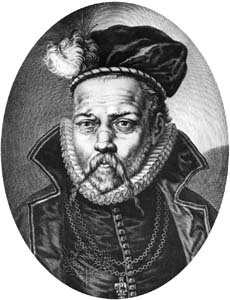

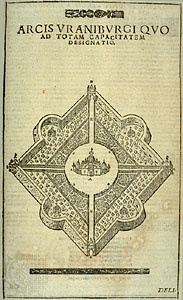 The new star in the constellation Cassiopeia had caused Tycho to rededicate himself to astronomy; one immediate decision was to establish a large observatory for regular observations of celestial events. His plan to establish this observatory in Germany prompted King Frederick II to keep him in Denmark by granting him title in 1576 to the island of Ven (formerly Hven), in the middle of The Sound and about halfway between Copenhagen and Helsingør, together with financial support for the observatory and laboratory buildings. Tycho called the observatory Uraniborg, after Urania, the Muse of astronomy. Surrounded by scholars and visited by learned travelers from all over Europe, Tycho and his assistants collected observations and substantially corrected nearly every known astronomical record.
The new star in the constellation Cassiopeia had caused Tycho to rededicate himself to astronomy; one immediate decision was to establish a large observatory for regular observations of celestial events. His plan to establish this observatory in Germany prompted King Frederick II to keep him in Denmark by granting him title in 1576 to the island of Ven (formerly Hven), in the middle of The Sound and about halfway between Copenhagen and Helsingør, together with financial support for the observatory and laboratory buildings. Tycho called the observatory Uraniborg, after Urania, the Muse of astronomy. Surrounded by scholars and visited by learned travelers from all over Europe, Tycho and his assistants collected observations and substantially corrected nearly every known astronomical record.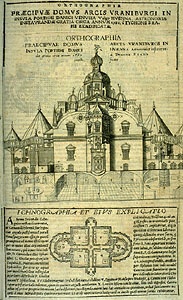 Tycho was an artist as well as a scientist and craftsman, and everything he undertook or surrounded himself with had to be innovative and beautiful. He established a printing shop to produce and bind his manuscripts in his own way, he imported Augsburg craftsmen to construct the finest astronomical instruments, he induced Italian and Dutch artists and architects to design and decorate his observatory, and he invented a pressure system to provide the then uncommon convenience of sanitary lavatory facilities. Uraniborg fulfilled the hopes of Tycho's king and friend, Frederick II, that it would become the centre of astronomical study and discovery in northern Europe.
Tycho was an artist as well as a scientist and craftsman, and everything he undertook or surrounded himself with had to be innovative and beautiful. He established a printing shop to produce and bind his manuscripts in his own way, he imported Augsburg craftsmen to construct the finest astronomical instruments, he induced Italian and Dutch artists and architects to design and decorate his observatory, and he invented a pressure system to provide the then uncommon convenience of sanitary lavatory facilities. Uraniborg fulfilled the hopes of Tycho's king and friend, Frederick II, that it would become the centre of astronomical study and discovery in northern Europe.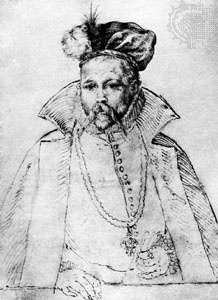 But Frederick died in 1588, and under his son, Christian IV, Tycho's influence dwindled; most of his income was stopped, partly because of the increasing needs of the state for money. Spoiled by Frederick, however, Tycho had become both unreasonably demanding of more money and less inclined to carry out the civic duties required by his income from state lands.
But Frederick died in 1588, and under his son, Christian IV, Tycho's influence dwindled; most of his income was stopped, partly because of the increasing needs of the state for money. Spoiled by Frederick, however, Tycho had become both unreasonably demanding of more money and less inclined to carry out the civic duties required by his income from state lands.At odds with the three great powers—king, church, and nobility—Tycho left Ven in 1597, and, after short stays at Rostock and at Wandsbek, near Hamburg, he settled in Prague in 1599 under the patronage of Emperor Rudolf II, who also in later years supported the astronomer Johannes Kepler (Kepler, Johannes).
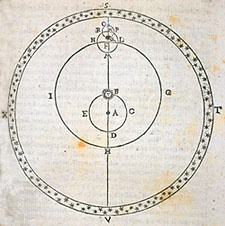 The major portion of Tycho's lifework—making and recording accurate astronomical observations—had already been done at Uraniborg. To his earlier observations, particularly his proof that the nova of 1572 was a star, he added a comprehensive study of the solar system and his proof that the orbit of the comet of 1577 lay beyond the Moon. He proposed a modified Copernican system in which the planets revolved around the Sun, which in turn moved around the stationary Earth. What Tycho accomplished, using only his simple instruments and practical talents, remains an outstanding accomplishment of the Renaissance.
The major portion of Tycho's lifework—making and recording accurate astronomical observations—had already been done at Uraniborg. To his earlier observations, particularly his proof that the nova of 1572 was a star, he added a comprehensive study of the solar system and his proof that the orbit of the comet of 1577 lay beyond the Moon. He proposed a modified Copernican system in which the planets revolved around the Sun, which in turn moved around the stationary Earth. What Tycho accomplished, using only his simple instruments and practical talents, remains an outstanding accomplishment of the Renaissance.Tycho attempted to continue his observations at Prague with the few instruments he had salvaged from Uraniborg, but the spirit was not there, and he died in 1601, leaving all his observational data to Kepler (Kepler, Johannes), his pupil and assistant in the final years. With these data Kepler laid the groundwork for the work of Sir Isaac Newton (Newton, Sir Isaac).
Additional Reading
J.A. Gade, The Life and Times of Tycho Brahe (1947, reprinted 1969), is the best account in English of Tycho's life and contains a fairly complete bibliography. J.L.E. Dreyer, Tycho Brahe (1890, reprinted 1963), presents an authoritative picture of his work and his astronomical instruments, by the astronomer who also prepared his collected works for publication.